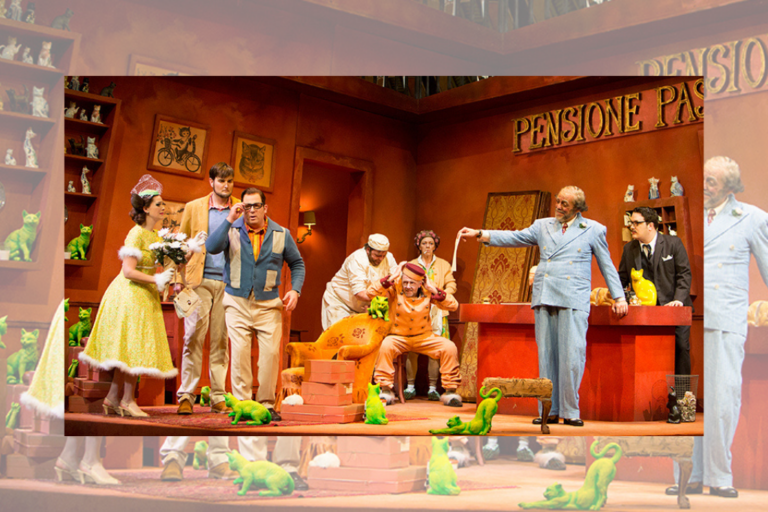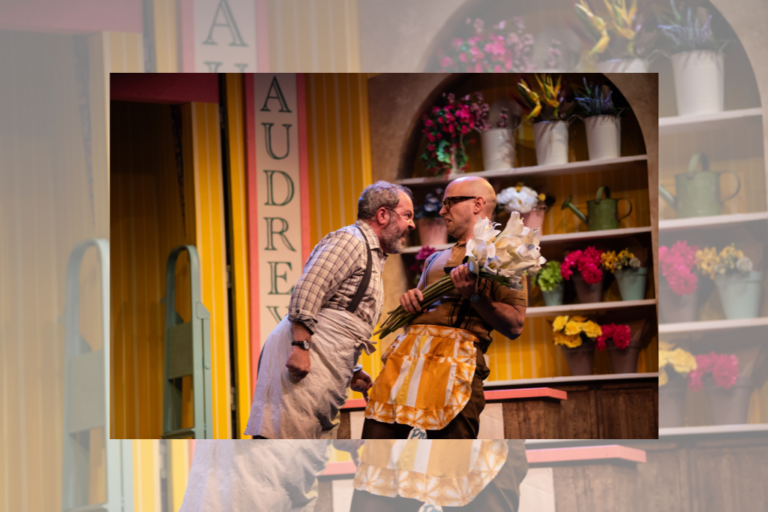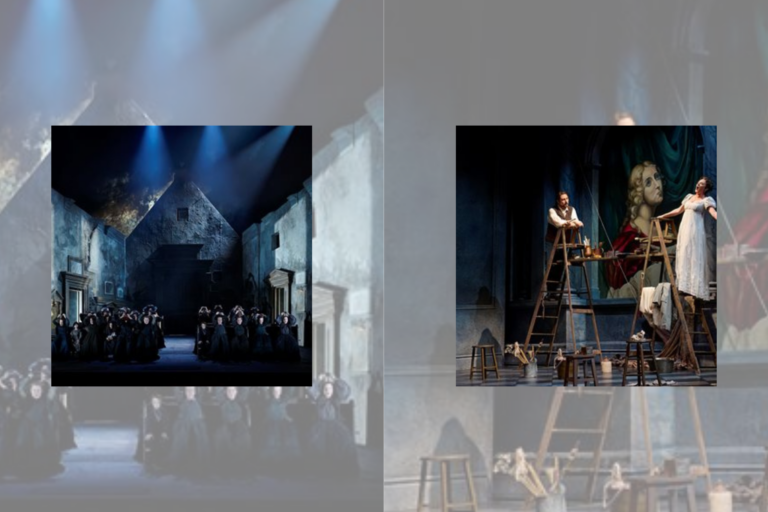REVIEW: Excellent singing elevates lacklustre productions in Faust and Nabucco
Is it about the music? Or is it about the production? The best of opera, of course, manages to offer audiences an exceptional musical experience that’s part of a coherent, spectacular, dynamic production.
Both operas in the Canadian Opera Company’s current fall repertoire, Faust and Nabucco, include stellar performances from world-class singers in productions featuring directorial and design choices that abandon historical accuracy and realistic mise-en-scène to varying degrees of success.
Faust adapts the well-known tale of the aged doctor, Dr. Faust, who sells his soul to the devil for everlasting youth. Gounod’s opera focuses on the relationship between Dr. Faust and Marguerite, who is seduced by the young and dashing doctor, but ultimately goes mad after he abandons her.
Amy Lane’s direction, in the first new COC co-production in six years (co-produced with Malmö Opera), involves many thematic and stylistic ideas, some of which contribute to the storytelling better than others. Emma Ryott’s set design, one of the better inventions of this production, includes a projection of an X-rayed lung, eight treelike structures that mimic the bronchi of the lung, and a spiral staircase that resembles a spine, leading either upward to heaven or downward to hell. With spine and lungs present, the literal and figurative heart of the opera is the love story between Faust and Marguerite. A chessboard stage floor suggests that the romance at the heart of the story is a game for Dr. Faust, which leads to tragic consequences for Marguerite.
Long Long’s Faust is a kind of everyman, a choice that feels hollow and under-realized in Lane’s production. After he expresses his wish to be young again and live forever, Long’s characterization, under Lane’s direction, does not provide the audience with insight into why he does what he does, specifically why he abandons Marguerite. The action that drives the plot happens to Faust in this production, rather than by his own hand. In contrast — think Macbeth and Oedipus Rex: more effective tragic heroes are generally responsible for their own downfalls. That being said, Long’s voice, a soaring powerful tenor, buoys his performance for the duration of the production.
Kyle Ketelsen’s Méphistophélès is sly, charming, and suave, dressed impeccably in a tuxedo, top hat, and cane (Ryott doubles as costume designer). His subtle and perfectly executed characterization matches a rich, full baritone voice. Two women dancers accompany him, dressed in matching top hats, vests, and gartered stockings, adding to the daemon’s sensuality as they pose and move lithely with him.
Though the character isn’t afforded much time for development in Gounod’s opera, Guanqun Yu’s Marguerite compellingly charts a transformation from a demure, innocent ingenue into a heartbroken, disillusioned madwoman. This extreme journey is matched by a beautiful, expressive soprano voice that fills the Four Seasons Centre for the Performing Arts, with Yu hardly opening her mouth to project such an impressive sound.
A highlight of Lane’s production comes after intermission when Marguerite, having given birth to Faust’s child, is praying in church for Faust to return to her and her infant. Méphistophélès cruelly convinces Marguerite that she is damned, prompting her descent into madness, while the chorus, dressed in black monastic robes that creepily shadow their faces, sing from the dimly lit edges of the stage. A towering figure atop a pedestal wears a long cape that stretches from their crown to the stage floor, imprinted with the design of a stained-glass window, adding to the unsettling spectacle of this moment.
This moment was one of the few that capitalized on the theatricality of a tale in which a devil and his demonic magic drive the action. Lane’s production misses many opportunities to include magical stage tricks to establish Méphistophélès’ demonic powers. And though the overall production is founded on a strong, clear visual concept, the set and costume design do not develop over the course of the opera, making the experience lack both figurative and literal magic.
Fortunately, conductor Johannes Debus, alongside chorus master Sandra Horst, rescues the production by leading the exceptional cast and a fiery orchestra to deliver Gounod’s lush romantic score.
Nabucco, a 2019 Lyric Opera of Chicago production making its COC debut, also feels like a missed opportunity, despite great performances and the opera’s thrilling drama. Once again, the music, conducted by Paolo Carignani with the help of Horst, makes the evening worthwhile.
Verdi’s opera tells the story of Nabucco, the Babylonian king, who’s marching toward the Holy Temple to conquer the Israelites in Jerusalem. While Ismaele, a Judean Prince, was in Babylon as an ambassador for the Israelites in Jerusalem, Nabucco’s eldest daughter, Abigaille, fell in love with him just as he fell in love with her sister Fenena. This sets the scene for a love triangle complicated by Ismaele’s duty to protect his people and the duty of two princesses to honour their father and his military conquest.
Top-notch singers bring the characters of Nabucco to life. Mary Elizabeth Williams’ Abigaille, the conniving schemer, demonstrates her capacity for vocal gymnastics that compellingly express her character’s obsessive anger and intense passion. Williams is afforded brief moments in the aria “Anch’io dischiuso un giorno” / “I too once opened my heart to happiness” to demonstrate her range when she tenderly sings of her love for Ismaele, who doesn’t return her affection.
Fenena, played by Rihab Chaieb, in contrast to Williams’ effusive performance, maintains a physical grace and poise, matched by a light, beautiful soprano.
As Nabucco, Roland Wood transforms from the imposing and powerful tyrant in the first half of the opera, matched by a deep, robust bass, into a Lear-like, impotent aged man who has lost his grip both on power and reality, supported by a softer and gentler tone in the second half. Though not given much stage time, Matthew Cairns’ Ismaele shines vocally as the generic romantic lead.
Katherine M. Carter’s production does not live up to the compelling story and the talent of the cast, as her staging does not complement the dramatic action. The chorus, which affords a director a chance to stage striking stage pictures, moves on and off stage awkwardly and rarely lands in dynamic positions that contribute to the storytelling. Though the individual performances are captivating, as a whole, the cast does not seem as if they are all performing in a coherent production.
Carter also misses an opportunity to provide commentary on the opera’s resonances with the current conflict in the Middle East. (Though the conflict has intensified over the past year when the opera was produced in 2019, the tensions in the region were still palpable prior to October 7, 2023.) While Jane Greenwood’s costumes — the Babylonians in blood red futuristic wear and the Israelites’ traditional religious costume in black and white — could perhaps be interpreted as a comment on the endless turmoil in that region and the timeless themes of individuals’ desires in conflict with community values and needs, this would be a generous reading.
Michael Yeargan’s set, a movable staircase that supports imposing columns stretching into the rafters painted a deep indigo blue, provides a structure for some striking images. Despite the few dramatic moments Yeargan’s design facilitates, there is no apparent rhyme or reason why the set is painted such a striking, anachronistic colour.
Despite weaknesses in the mise-en-scène of both operas, the performances, specifically the opportunity to witness the artistic power of the human voice that both Faust and Nabucco require, are worth the price of admission. Go for the music.
Faust runs until November 2, and Nabucco runs until October 25 at the Four Seasons Centre for the Arts. You can learn more about the productions here.
Intermission reviews are independent and unrelated to Intermission’s partnered content. Learn more about Intermission’s partnership model here.















Your reviews were thorough and interesting.
Thanks
Please repost with correct conductor attribution.